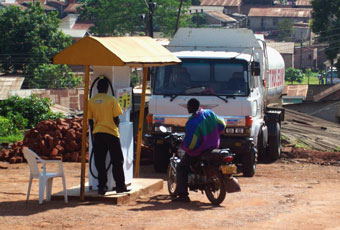
By Haggai Matsiko
Experts say government must plan for December and 2011 elections
Usually, when pump prices of petroleum products in Uganda shoot up, the government and oil sector operators blame it on some mishap in neighbouring Kenya.
This time there was neither malfunction at the Kenya Petroleum Refineries Ltd in Mombasa where it is processed and the Kenya Pipeline Company which transports it into the hinterland where Ugandan companies pick it, nor glitches at the Uganda border which are sometimes the perfect pretext for snarling up supply and hiking prices.
At the height of the latest fuel crisis in Uganda on Sept.16, the Kenyan ministry of Energy was warning that “the reported cases of fuel shortage around the country are alarmists and could be a ploy by some marketers to adjust pump prices charged to consumers.”
At the same time in Uganda, the Minister of Information, Kabakumba Matsiko, had finally found something to blame the fuel crisis on; piracy on the high seas had prevented oil ships from arriving on time, she said. Managing Director of Total Uganda, Mamadou Ndom, toed the same line.
“Even in Kenya there is no petrol, so this is not only our problem,” he said.
But that was little consolation for Ian Malugge whose car, a Toyota Mark II, had by Sept. 16 been stuck an empty petrol station in the suburbs of Kampala city for three days.
Malugge, 44, a resident of Luzira can no longer drive his four children to school and wife to work. Instead he has to fork-out transport fare for each of them.
Since fuel scarcity hit Kampala and most parts of the country, transport fares have gone up. Taxi operators blame the increase on fares in the rise in the pump price for all products.
In Kenya, despite the fake scarcity scare, fuel prices only rose by 5 percent only, from an average KShs 95 per liter for petrol to Kshs 100 (Approx. Shs2, 800). In Uganda, the pump of petrol has swung by 20 percent upwards from Shs 2,900 to Shs 3,500.
As a result Malugge says he is now getting accustomed to spending Shs 15,000 per day on transport, instead of the Shs 8,000 he used before.
He could soon start spending even more if the predictions by some oil sector players are accurate.
This is the second time this year alone the country is hit by a fuel crisis and experts warn that the shortage could hang on until the end of the year. From March to April, Uganda was locked in a fuel crisis that dealers blamed on disruptions in the Arabian Gulf and a depreciating dollar that had made oil imports expensive.
Even in the best times, different petrol station dealers say that they operate below capacity; stocking and selling less than demanded by the market.
Although most of the Shell petrol stations in city suburbs have capacity to stock over 20,000 litres, they only receive between 5000 to 10,000 litres which barely lasts a day leaving them with no fuel at all for the rest of the week.
“Our stock is small and the demand is high,” says Total boss Mamadou Ndom.
The result has been rationing, hording, consumer discrimination, and price hikes.
Although Shell Uganda Chairman Ivan Kyayonka was not available for comment, his company’s quitting its downstream businesses in 21 countries in Africa including Uganda, could be a factor in the current fuel mess.
Sources in the oil industry also say that Total’s acquisition of Caltex’s businesses cannot be down played as the company now has to supply more dealers yet with fixed logistics.
As of April 2010, Total Uganda had the most petrol stations in the country at 140.
On the other hand Shell with a fluctuating market share of 34 percent and 120 petrol stations according to the Association of Petroleum Marketing Professionals, has increasingly been faced with declining profits.
Industry figures indicate that small independent operators have eaten into the sector profit margins because they control considerable market share; Gapco (7 percent), Kobil (5 percent), Engen (3 percent), and an estimated 31 percent by myriad small operators.
This, sources say, explains why Uganda’s largest petroleum products companies are the worst affected yet small companies like City Oil and Engen often have products.
Records at Uganda Bureau of Statistics show that there were 189, 105 cars in 2000 and 445,923 today. Despite the increase in the number of vehicles, the country’s fuel storage capacity remains low and supply has grown at a rate of 5 percent while motor vehicle imports have grown at 9 percent per year.
A report entitled “Determinants of Fuel Supply Costs,” presented by the Ministry of Energy in June 2008 warned that the high increase in the number of vehicles at the rate of 9 per cent every year was likely to amount a lot of pressure on the petroleum products supply logistics.
Oil dealers say that that the shortage is compounded by the change from four- axle to three-axle trucks, a directive by the government that has meant transportation of low volumes of petrol over long distances.
That reduced the volume of fuel carried by each road tanker from 42,000 litres to 35,000 litres- enough to supply a petrol station for a day.
The Kenya-Uganda pipeline that would have helped matters is yet to take off and those close to President Yoweri Museveni say that since the discovery of oil interest in the pipeline venture and storage facility ebbed.
Consequently, the country remains vulnerable to petroleum price fluctuations and shortages.
According to the Petroleum Supply Department Uganda consumes 940,000 litres of petrol, 1,585,000litres of diesel and 170,000 litres of kerosene daily.
Although, the Petroleum Supply (General) Regulations, 2009, require fuel dealers to have a “Contingency and Emergency Petroleum Supply Plan” in the event of scarcity, the supply capacity remains very low and whichever supplies are brought in are consumed in a short period of time.
Following the fake fuel crisis, the Kenyan Energy ministry Permanent Secretary, Patrick Nyoike, called in the fuel sector operators to strongly protest the hike in prices. He also announced that the Kenyan government was making special arrangements to ensure additional import of oil products in preparation for the December holidays.
Some observers say the Uganda government needs to follow the Kenya example. It must plan for stable fuel supplies during the 2011 general elections.
 The Independent Uganda: You get the Truth we Pay the Price
The Independent Uganda: You get the Truth we Pay the Price


